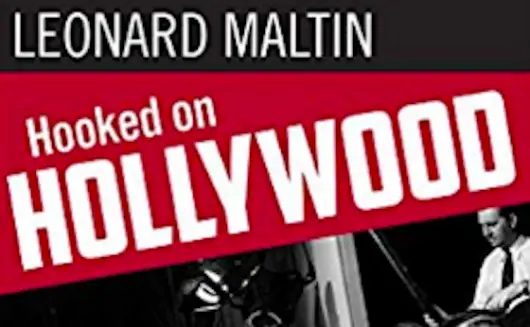
In Hooked on Hollywood: Discoveries from a Lifetime of Film Fandom, film critic/historian Leonard Maltin takes us on a time machine back to Hollywood’s Golden Era.
Maltin has been writing about film for many years–dating back to when he contributed to Film Fan Monthly. In fact, some of the pieces in the book originally appeared there or his newsletter. Divided into four sections, it wouldn’t be unfair to call this book a time machine of joy for film fans.
The first section, Hollywood Featurettes, features articles from the Movie Crazy newsletter. Among the headliners is a piece on Casablanca. Most of us remember Casablanca for “As Time Goes By.” What Maltin does is take us beyond that by looking into the film’s music. The first few pieces of this section focus on music. Maltin explores the road of the Rodgers-Hart musical, On Your Toes. This 1936 Broadway hit completely flopped at the box office in 1939. Everyone would be shocked if a Broadway musical didn’t spell box office success in this era. When Lorenz Hart died in 1943, Richard Rodgers would team up with Oscar Hammerstein II. Following what happened in the 1930s, he made sure they maintained full control of the movie rights.
Maltin writes of how television introduced him to silent films. This leads directly into Buster Keaton and a fascinating Charlie Chaplin anecdote.
This first section closes with a discussion of Hollywood remakes. In case it can’t be said enough, Hollywood ought to come up with new and original ideas. But enough about my thoughts, what does Maltin say? Maltin recounts a publicist for Columbia once being told not to use the word “remake” but instead “re-imagining.” Films from the 1920s were being remade in the 1930s to no avail. Nobody remembers these in the same way as the earlier classics. There are exceptions: Cecil B. DeMille’s The Ten Commandments (1956) and Alfred Hitchcock’s The Man Who Knew Too Much (1956). These two films are the rare exceptions. There’s talk on Laurel and Hardy reusing older material that audiences possibly forgot about.
The second section, Early Interviews, sees Maltin resharing those interviews from when he was a teenager. Maltin uses the intro to set up how he was able to interview Eddie Bracken back in the day. Maltin notes that this was an era before the internet, home video, and of course, IMDB. Maltin’s interview with Robert Youngson is fascinating because of the comedy aspect. The His Girl Friday fan that I am meant having excitement in reading Maltin’s conversation with Ralph Bellamy. Bellamy provides some interesting insight about The Awful Truth.
The third section is appropriately titled Later In-Depth Interviews. There’s a shorter amount of interview subjects but Maltin doesn’t lie when he calls them in-depth. This section starts with John Cromwell. In case your were wondering, he’s James Cromwell’s father. Maltin’s conversation with Dick Jones is the surefire headliner of this section. Jones is best known for starring as the voice of Pinocchio in the animated Disney classic of the same name.
Maltin uses the final section of the book for RKO Revisited. When we think of the major studios, RKO is high up on the list yet they never survived beyond the 1950s. Founded in 1928, the studio would become defunct in 1959. During the Hollywood Golden Era, RKO was among the Big Five. The Big Five consisted of Fox, Loew’s (MGM parent), Paramount Pictures, RKO Pictures, and Warner Bros. Other studios around at this time were Universal, Columbia, and United Artists. The latter weren’t among the Big Five because they did not own as many theaters. The Paramount antitrust lawsuit in 1948 combined with Howard Hughes’ efforts eventually led to RKO’s demise. After discussing RKO, Maltin then goes through a number of obscure, ignored, and need-another-look films from the studio.
If there’s a Mount Rushmore of film critics/historians, it wouldn’t be complete without Leonard Maltin. Hooked on Hollywood is one of many reasons why.



